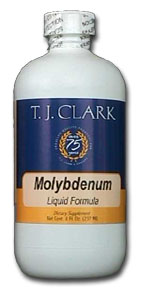| Liquid Molybdenum
 T.
J. Clark Liquid Molybdenum: T.
J. Clark Liquid Molybdenum:

Molybdenum (Mo) is an essential nutrient for
animals and
humans. Tissue content of molybdenum is low, with the highest
concentrations in the liver, kidney, adrenal gland and bone. It is a
component of a number of enzymes, including sulfite oxidase
(involved in the metabolism of sulfur amino acids), xanthine
oxidase (involved in the oxidation of purines and pyrimidines and
the production of uric acid), and aldehyde oxidase (involved in the
oxidation of aldehydes). These enzymes share a common
"molybdenum cofactor."
Deficiencies: Molybdenum deficiency is extremely rare and has only
been identified in the presence of other serious disorders. Metabolic
defects in the molybdenum cofactor are characterized by the absence of
the three molybdoenzymes. Both the deficiency and the metabolic
disorders are accompanied by abnormal excretion of sulfur metabolites,
low uric acid concentrations, and elevated hypoxanthine and xanthine
excretion. The absence of sulfite oxidase in the metabolic disorder leads
to death at an early age.
Diet recommendations: The Estimated Safe and Adequate Dietary
Intakes of molybdenum (µg/day) are: 15-30 at age 0-6 months, 20-40
for 6-12 months, 25-50 for 1-3 years, 30-75 for 4-6 years, 50-150 for
7-10 years, and 75-250 for adolescents and adults. This range is based
on the usual dietary intake, about 75 to 240 µg/day by adults. The range
was extrapolated for other age groups on the basis of body weight.
Food sources: Rich sources of molybdenum include legumes, cereal
products, and leafy vegetables. The amount in foods depends on the soil
molybdenum content. Molybdenum is very well absorbed, but its
bioavailability may be affected by some food components.
Toxicity: Molybdenum toxicity is much more likely than deficiency.
Toxicity is common in cattle grazing in pastures with high molybdenum
soil. A high incidence of gout has been reported in humans with intakes
of 10-15 mg/day.
Recent research: Controlled studies in humans suggest that the
molybdenum requirement is well below the usual dietary intake, which is
consistent with lack of molybdenum deficiency in the US population.
Bioavailability studies suggest that molybdenum is less well absorbed
from soy products than from leafy vegetables.
|
Supplement Facts
Serving Size: 1 Teaspoon (5ml)
Serving Per Container: 47 |
| |
Amount
per serving |
% USRDA |
|
Calories |
4 |
<2 |
|
Total Carbohydrate |
1 g |
<2 |
|
Total Fat |
0 g |
0 |
|
Sodium |
0 g |
0 |
|
Molybdenum |
75 mcg |
100 |
|
Phytogenic Mineral Catalyst |
100 mcg |
** |
|
Calcium, Chloride, Cobalt, Chromium, Magnesium,
Boron, Manganese, Molybdenum, Selenium, Iron, Copper, Phosphorus,
Sulfur, Potassium, Iodine and Zinc |
|
* Percent Daily Values based on a 2,000 calorie
diet
** No daily value established |
|
Directions: Take 5 ml once daily with food |
|
* This statements have not been
evaluated by the Food and Drag Administration.
This products are not intended
to diagnose, treat, cure or prevent any disease. |
|
|

